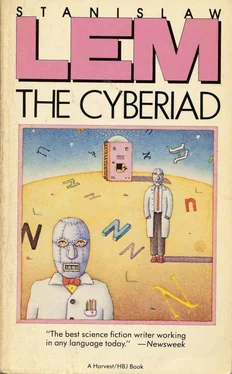And so munitions electricians worked day and night, turning out plugs and sockets by the carload, and these were installed as necessary in all the barracks. Covered with medals, Klapaucius rode from garrison to garrison and supervised everything. Trurl fared similarly in the kingdom of Atrocitus, except that, due to that monarch’s well-known parsimony, he had to content himself with the lifelong title of Great Betrayer of the Fatherland. Both kingdoms were now preparing for war. In the heat of mobilization, conventional as well as nuclear weapons were brought into battle trim, and cannons and atoms subjected to the utmost spit and polish, as per regulations. Their work now all but done, the two constructors packed their bags in secret, to be ready to meet, when the time came, at the appointed place near the ship they had left in the forest.
Meanwhile miracles were taking place among the rank and file, particularly in the infantry. Companies no longer had to practice their marching drills, nor did they need to count off to learn their number, just as one who has two legs never mistakes his right for his left, nor finds it necessary to calculate how many of himself there are. It was a joy to see those new units do the Forward March, About Face and Company Halt; and afterwards, when they were dismissed, they took to chatting, and later, through the open windows of the barracks one could hear voices booming in chorus, disputing such matters as absolute truth, analytic versus synthetic a priori propositions, and the Thing-in-itself, for their collective minds had already attained that level. Various philosophical systems were hammered out, till finally a certain battalion of sappers arrived at a position of total solipsism, claiming that nothing really existed beyond itself. And since from this it followed that there was no King, nor any enemy, this battalion was quietly disconnected and its members reassigned to units that firmly adhered to epistemological realism. At about the same time, in the kingdom of Atrocitus, the sixth amphibious division forsook naval operations for navel contemplation and, thoroughly immersed in mysticism, very nearly drowned. Somehow or other, as a result of this incident, war was declared, and the troops, rumbling and clanking, slowly moved towards the border from either side.
The law of Gargantius proceeded to work with inexorable logic. As formation joined formation, in proportion there developed an esthetic sense, which reached its apex at the level of a reinforced division, so that the columns of such a force easily became sidetracked, chasing off after butterflies, and when the motorized corps named for Bartholocaust approached an enemy fortress that had to be taken by storm, the plan of attack drawn up that night turned out to be a splendid painting of the battlements, done moreover in the abstractionist spirit, which ran counter to all military traditions. Among the artillery corps the weightiest metaphysical questions were considered, and, with an absentmindedness characteristic of great genius, these large units lost their weapons, misplaced their equipment and completely forgot that there was a war on. As for whole armies, their psyches were beset by a multitude of complexes, which often happens to overly developed intellects, and it became necessary to assign to each a special psychiatric motorcycle brigade, which applied appropriate therapy on the march.
In the meantime, to the thunderous accompaniment of fife and drum, both sides slowly got into position. Six regiments of shock troops, supported by a battery of howitzers and two backup battalions, composed, with the assistance of a firing squad, a sonnet entitled “On the Mystery of Being,” and this took place during guard duty. There was considerable confusion in both armies; the Eightieth Marlabardian Corps, for instance, maintained that the whole concept of “enemy” needed to be more clearly defined, as it was full of logical contradictions and might even be altogether meaningless.
Paratroopers tried to find algorithms for the local terrain, flanks kept colliding with centers, so at last the two kings sent airborne adjutants and couriers extraordinary to restore order in the ranks. But each of these, having flown or galloped up to the corps in question, before he could discover the cause of the disturbance, instantly lost his identity in the corporate identity, and the kings were left without adjutants or couriers. Consciousness, it seemed, formed a deadly trap, in that one could enter it, but never leave.
Atrocitus himself saw how his cousin, the Grand Prince Bullion, desiring to raise the spirits of his soldiers, leaped into the fray, and how, as soon as he had hooked himself into the line, his spirit was literally spirited away, and he was no more.
Sensing that something had gone amiss, Ferocitus nodded to the twelve buglers at his right hand. Atrocitus, from the top of his hill, did likewise; the buglers put the brass to their lips and sounded the charge on either side. At this clarion signal each army totally and completely linked up. The fearsome metallic clatter of closing contacts reverberated over the future battlefield; in the place of a thousand bombardiers and grenadiers, commandos, lancers, gunners, snipers, sappers and marauders—there stood two giant beings, who gazed at one another through a million eyes across a mighty plain that lay beneath billowing clouds. There was absolute silence. That famous culmination of consciousness which the great Gargantius had predicted with mathematical precision was now reached on both sides. For beyond a certain point militarism, a purely local phenomenon, becomes civil, and this is because the Cosmos Itself is by nature wholly civilian, and indeed, the minds of both armies had assumed truly cosmic proportions! Thus, though on the outside armor still gleamed, as well as the death-dealing steel of artillery, within there surged an ocean of mutual good will, tolerance, an all-embracing benevolence, and bright reason. And so, standing on opposite hilltops, their weapons sparkling in the sun, while the drums continued to roll, the two armies smiled at one another. Trurl and Klapaucius were just then boarding their ship, since that which they had planned had come to pass: before the eyes of their mortified, infuriated rulers, both armies went off hand in hand, picking flowers beneath the fluffy white clouds, on the field of the battle that never was.
The First Sally (A)
or
Trurl’s Electronic Bard

First of all, to avoid any possible misunderstanding, we should state that this was, strictly speaking, a sally to nowhere. In fact, Trurl never left his house throughout it— except for a few trips to the hospital and an unimportant excursion to some asteroid. Yet in a deeper and/or higher sense this was one of the farthest sallies ever undertaken by the famed constructor, for it very nearly took him beyond the realm of possibility.
Trurl had once had the misfortune to build an enormous calculating machine that was capable of only one operation, namely the addition of two and two, and that it did incorrectly. As is related earlier in this volume, the machine also proved to be extremely stubborn, and the quarrel that ensued between it and its creator almost cost the latter his life. From that time on Klapaucius teased Trurl unmercifully, making comments at every opportunity, until Trurl decided to silence him once and for all by building a machine that could write poetry. First Trurl collected eight hundred and twenty tons of books on cybernetics and twelve thousand tons of the finest poetry, then sat down to read it all. Whenever he felt he just couldn’t take another chart or equation, he would switch over to verse, and vice versa. After a while it became clear to him that the construction of the machine itself was child’s play in comparison with the writing of the program. The program found in the head of an average poet, after all, was written by the poet’s civilization, and that civilization was in turn programmed by the civilization that preceded it, and so on to the very Dawn of Time, when those bits of information that concerned the poet-to-be were still swirling about in the primordial chaos of the cosmic deep. Hence in order to program a poetry machine, one would first have to repeat the entire Universe from the beginning—or at least a good piece of it.
Читать дальше













